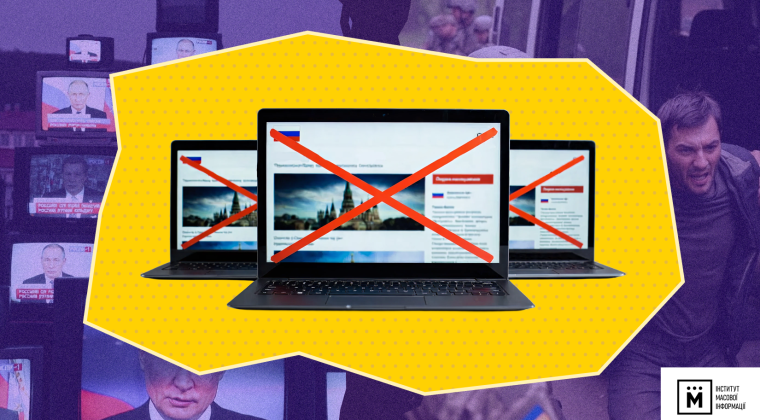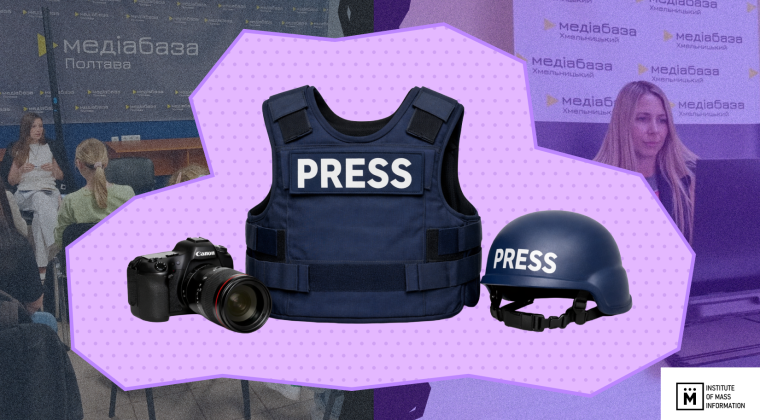The Russian opposition has no claim to moral leadership unless they acknowledge that Putin’s regime arose with Russian society’s tacit consent and thanks to its imperialistic mindset. Still, the “good Russians” actively promote the Navalny cult in the West and argue that the future of Ukraine, Europe, and maybe even global democracy depends on them. Russian oppositionists either sincerely do not realize, or pretend not to realize, that their biggest problem at this time is Russia’s aggression and Russia’s imperial ambition and that they, too, are to blame for the deterioration of Russia’s state model. They consistently deny the Russians’ collective responsibility for the war on Ukraine, which was unleashed by the regime whose creation the citizens of Russia allowed.
Even though the number of Russian oppositionists in the West grew following the August 2024 prisoner swap, they have offered no new ideas and no effective steps to fight Putin’s imperialist regime.
IMI experts analyzed the public statements made by some Russian opposition figures on October 1–9, 2024. The IMI’s analysis showed that the gulf between the Russian opposition abroad and the Russians who stayed in their country is growing. With only a “demand for a representative mission” for emigrants to offer, these activists generally avoid the core issue: breaking with the imperial past and transforming the Russian Federation. Viewing the content shared by Russian oppositionists on social media points one to such conclusions.
The core narrative of “Good Russians”:
assistance to substitute accountability
Of the prisoners released by the Kremlin regime in the August 2024 swap, journalist Vladimir Kara-Murza has built the largest public presence abroad so far. He travels across Europe and actively opines on the West, Russia, and Ukraine. In October, he spoke at a meeting of the Parliamentary Assembly of the Council of Europe. Reporting on this on X (previously Twitter), Kara-Murza stressed:
“We will work together to bring the day when Europe becomes truly free, peaceful, and united – with a democratic Russia taking part.”
This statement looks like an attempt to whitewash Russia’s image or create the impression that Russia’s democratic transformation will automatically lead to stability and peace in Europe. Moreover, such a focus on a future “with Russia taking part” seems quite manipulative, as it draws attention away from the crimes being committed by Russia right now in Ukraine. Kara-Murza’s words imply that peace and unity in Europe depend on some concessions or compromises with Russia. In reality, peace in Europe is contingent on Ukraine’s victory and bringing the aggressor to justice.
During his speech at the PACE, Vladimir Kara-Murza, as Russian oppositionists typically do, insisted that there are “two Russias”: the country with its good citizens and the state with Putin’s regime.
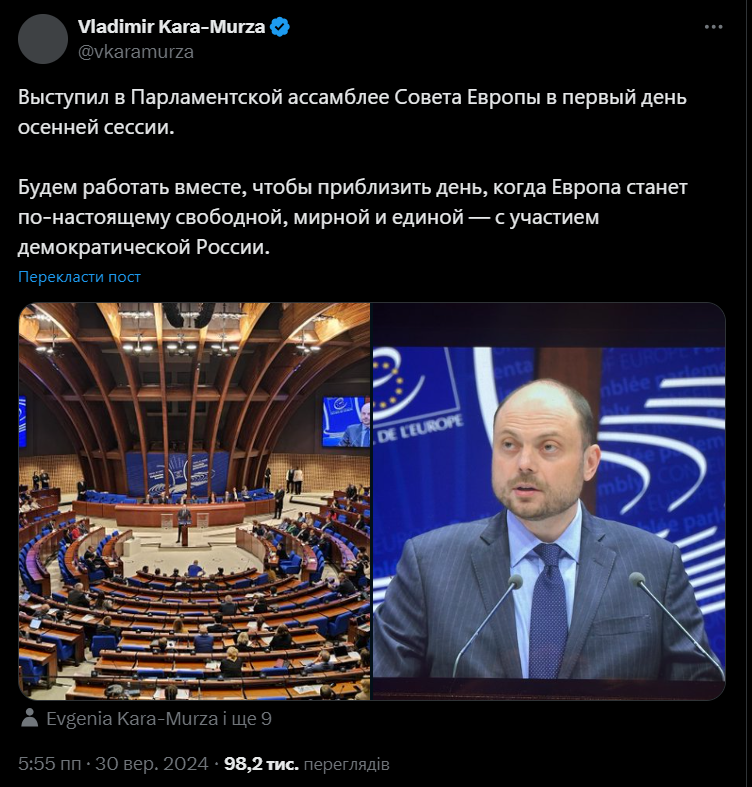
Vladimir Kara-Murza on X; screenshot by the IMI
“This is not a Russia of murderers and the war criminals sitting in the Kremlin, but a Russia of decent and good-hearted people who oppose them,” Deutsche Welle quotes Kara-Murza as saying. He reposted the quote on X. The idea that there is a “bad state” and a “good Russia of its citizens” is a convenient manipulation that allows the opposition to distance themselves from the crimes committed by the Russian state. Such statements produce a dangerous discourse wherein a part of society is considered the “victims” of the regime, not its accomplices. This, in turn, blurs the notion of collective accountability for aggression.
In the same article, Deutsche Welle revealed another interesting fact: “In response to a comment by the PACE deputy from Ukraine, Olena Khomenko, who remarked that words should be corroborated by action, Kara-Murza said that the Free Russia Foundation, of which he is the vice president, actively assists in the search for Ukrainian prisoners of war and civilians detained in Putin’s prisons. Of the 4,000 people who came back to Ukraine during the war as part of the regular swaps, over 900 were found thanks to the efforts of the Foundation,” writes Deutsche Welle.
Saying that the Free Russia Foundation played a key role in the release of more than 900 Ukrainian prisoners appears to be an attempt to take the credit to boost the “good Russians'” international political capital. In fact, freeing prisoners is a very complex process that requires coordination between state institutions, civil society and international organizations, as well as the military. Of course, any contribution to this process is valuable, but to publicly appropriate the leading role in the release of a quarter of Ukrainian prisoners like this sounds quite manipulative and as an attempt to make the Russian opposition appear more legitimate in front of European officials.
At the same time, Vladimir Kara-Murza internationally spreads the message that in order to solve all the problems and troubles created by Russia, the West should focus on helping the “good Russians” above all. This idea appears to be central to all of Kara-Murza’s posts reporting on meetings with European leaders:
- “Had an important and thorough conversation with the Secretary General of the Council of Europe, Alain Berset, about continuing the dialogue with Russia’s civil society. The day will come when a free, peaceful, and democratic Russia will be able to return to the European community”, the Russian activist writes on X.
- He reiterates this opinion after meeting with the President of the Czech Republic: “Had a conversation with the President of the Czech Republic, Petr Pavel. I am grateful for the opportunity to discuss the situation with political prisoners in Russia, the need for dialogue between the EU and Russia’s civil society, and Czechia’s successful experience of post-totalitarian trainsition,” he says.
Kara-Murza also demanded that the international community intervene in the fate of the Russians while speaking with the President of Austria. “I am grateful to the President of Austria, Alexander van der Bellen, for the meeting and the frank conversation. We discussed the political prisoners in Russia – already over 1,300 people, and the number is growing every day. This crisis needs attention, and an intervention by the international community,” the post reads. It was in Austria, as Vladimir Kara-Murza’s profile on X shows, that he found the most understanding. After all, it was there that he and his wife Evgenia received a human rights award. “The Kara-Murza couple was awarded the Bruno Kreisky Prize for Human Rights in Austria for their efforts to ‘bring the government of the Russian Federation and corrupt Kremlin officials to justice for violating human rights, democracy, and the rule of law.’ The award ceremony took place in Vienna”, reads the DW post shared by Kara-Murza on his page. Evidently, the prizes are given to those who fight Kremlin officials not for results, but for the effort, as a gesture of political support.
Kara-Murza’s rhetoric, which boils down to appeals to the Western world to support the “good Russians”, is worrisome because it focuses on preserving Russia’s existing domestic agenda instead of fighting aggression and addressing its consequences. The “good Russians” consistently shift the blame for the crimes onto the “bad” Russians in the Kremlin, and demand that the international community “save the Russian opposition” while offering no effective means to counteract the Kremlin. Such a position completely disperses the focus of international politics, diverting attention from helping Ukraine in its struggle and from holding Russia accountable for aggression.
Hyperpersonalizing the aggression for the Russian opposition’s comfort
Vladimir Kara-Murza’s Europe tour attracted the attention of “Voice of America”. The news outlet released an interview with the Russian activist, where he continues to reduce the problem of Russia’s aggression to one person’s wrongdoing: Vladimir Putin. “Sanctions must be tailored to really hit Putin’s war machine, to really hit Putin’s war economy, to make it as difficult as possible, and ideally impossible, for Putin to continue this war,” Kara-Murza quotes his interview on X.
Hyperpersonalizing Russia’s aggression is politically convenient for the Russian opposition, yet very dangerous, as it overlooks the deep, structure-level causes for the aggression, namely the imperialist ideology, the vast majority of Russian society supporting the Kremlin’s policies, the role of Russian elites (and the role of the Russian opposition) in shaping these policies. The Russian opposition is actively selling the West the illusion that when Putin is gone, all problems will be automatically resolved – but this is highly unlikely.
Kara-Murza’s statements about the need to “change” sanctions appear to be a call to soften the sanctions against “good Russians” or against businesses associated with the opposition. This, of course, diverts attention from the main purpose of the sanctions, which is to curb the inflow of resources for the Russian war machine, and creates a risk of “watering down” the sanctions mode.
In his interview with the Voice of America, Kara-Murza also spoke about the ideas he is explaining to world leaders: that Russia is capable of becoming a democracy; who will benefit from Russia collapsing into separate states; and how the sanctions against Russia should be changed.
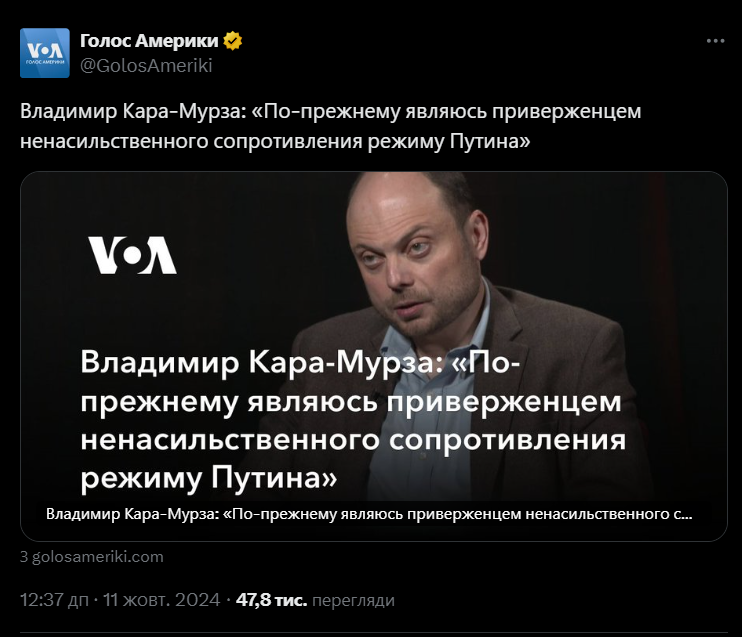
Vladimir Kara-Murza on X; screenshot by the IMI
Kara-Murza remains in a paradigm that can hardly be called reasonable. He says that the talks on ending Russia’s aggression should happen on Ukraine’s terms, but sees no need for active resistance against the dictator. “As before, I am a supporter of non-violent resistance to Putin’s regime,” says Kara-Murza. It seems that this oppositionist gravely underestimates the level of repression and brutality perpetrated by the Russian regime – not judt against Ukraine and other countries, but also against their own people.
Furthermore, in an X post, Kara-Murza shared an excerpt of his interview with the resource “Eshkin Krot” where he shifts the blame for the rise of a dictatorship in Russia to the West.
“Speaking about the accountability of Russian society, let’s not forget the collective responsibility of the democratic West’s leaders, who met the first years of Putin’s reign by offering him a reboot of relations, looking into his eyes and seeing his soul there,” says Kara-Murza.
The Russian opposition has been promoting these messages for many years. The only thing that sets Kara-Murza’s position apart is his understanding of the potential benefits of Russia’s dissolution into several separate entities. However, efforts to deny the blame for their country’s actions and the situation within it remain a common feature of all Russian activists who are claim to be fighting Putin but are in fact just waiting for the problem to either resolve itself or for someone else to resolve it. Still, they remain confident that the world should listen to them and not just when it comes Russia’s future, but also when it comes to the fate of Ukraine and Europe’s prospects.
The Russian opposition, which found itself in exile, is deliberately trying to take the role of the West’s primary partner in the fight against Russia’s imperialist regime. However, the tangible results of such work are quite insignificant or entirely symbolic. Instead of consolidating international efforts to support Ukraine and fight against Russian aggression, Kara-Murza and “good Russians” like him focus on creating the impression that the international community owes something to Russian activists.
Framing the war as Russia’s “domestic matter” and “economic issue”
Statements by Andrei Pivovarov, another person released in the Russian political prisoner swap, follow this logic as well. He is not as active as Kara-Murza, but just as persistent in his attempts to draw a line between the “bad” Russia and the “good” Russia, between Putin and the Russian people, in terms of responsibility for the aggression against Ukraine.
“As I understand it, 10–15% of Russians support the war. The rest (not counting the opposition-minded and vehemently anti-war people) are dissatisfied with what is happening and want it to end as soon as possible,” Andrei Pivovarov says on X, announcing his interview with Deutsche Welle.
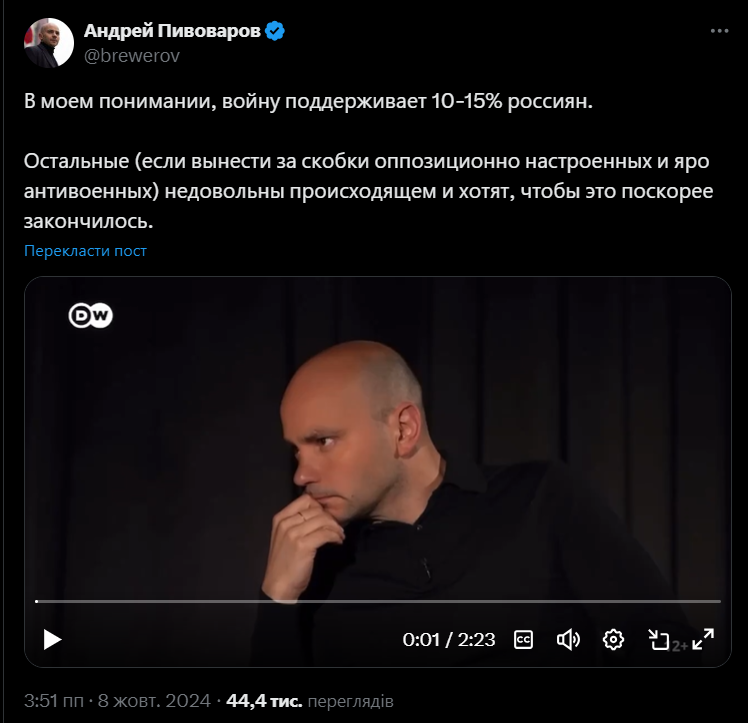
Andrei Pivovarov on X; screenshot by the IMI
In the interview with TV 2, titled “Why Did Putin Need a War in Ukraine”, he proposes the same opinion, describing an attack on a neighboring country as a matter of Russia’s domestic policy. An excerpt of this conversation was also posted on X.
The former political prisoner criticizes the war on Ukraine mainly for the harm it is doing to Russia, not so much in terms of the loss of human life, but in terms of financial losses.
“The authorities plan to spend 90 billion rubles in the next three years on one-time payments to those signing contracts with the Ministry of Defense. They plan to recruit at least 255,000 contract soldiers. Let’s set aside for a second the fact that the state wants to send another 255 thousand of its citizens to slaughter. But even if you just think about the financial aspect. 90 billion rubles of budget money from Russian taxpayers. What did you spend them on?” writes Pivovarov on X.
That is, Pivovarov sees the citizens of Russia as the victim in the war on Ukraine and calls on Europe to save them. His rhetoric fails take into account the tragedies of Ukrainians – the dead, the wounded, the destroyed cities, the millions of refugees.
His statements essentially ignore the colonialist nature of Russia’s aggression and create the illusion that the war is merely a tool for boosting Putin’s domestic power. In this way, the Russian opposition underplays the role of Russia’s imperialist ambition and its long-standing policy of subjugating the neighboring states. With his appeals, Pivovarov lifts the responsibility from Russian society and tries to frame the war as merely an unfortunate accident, not a natural outcome of Russia’s policies.
In addition, Pivovarov’s rhetoric, which emphasizes the financial costs and the loss of Russian life, rather than the destruction and loss of life in Ukraine, vividly demonstrates how self-centered the Russian opposition is.
Political representation as escape from accountability
In the meantime, Ilya Yashin, seen by a certain part of opposition-minded Russians as their leader, tries to justify these expectations in a way traditional for the Russian opposition. He, too, travels around Europe and holds public meetings “with like-minded people,” as he writes on his social media. That is to say, with the same “victimized” Russians who dream of a democratic Russia while living somewhere in Barcelona, Paris, Vilnius, Warsaw, Budva, Amsterdam, or Prague. It is in these European capitals that Yashin gathers his compatriots and speaks to them about the importance of meeting the “demand for political representation of Russians abroad.”
“I found some things that I can do and where I can be useful. It seems to me that we all need some kind of a representative office, the lack of it is felt. This is a demand I see among people in different cities. I understand that Russians, who have become much more numerous in Europe following the Russian invasion of Ukraine, need adequate political representation. And this is the work I am willing to do,” he writes on Telegram.
Sure, having a profitable occupation is important for a peaceful life in Europe. But the political representation of what actor are we talking about? Does he mean the Russian refugees’ desire to have official influence on the policies of European countries, to have access to their leaders, to tell them what to do with Ukraine and how to help Russia? After all, these are the same people with Russian passports who cast 72% of their votes for Putin while living abroad.
In the same post, Yashin stresses the Russians’ suffering from the war on Ukraine: “For two and a half years now, we have been severely distressed.” This is an example of self-centered manipulation where “good Russians” try to make the international community feel sorry for them. Such calls for sympathy for poor Russians who are “distressed” blur the moral principles, seeing as Ukrainians have been suffering colossal losses and face daily war crimes at the same time. It seems that the “good Russians” are making efforts to underplay the moral difference between the aggressor and the victim.
In another X post, as well as in his YouTube video, he essentially argues that the Russians are not to blame for anything.
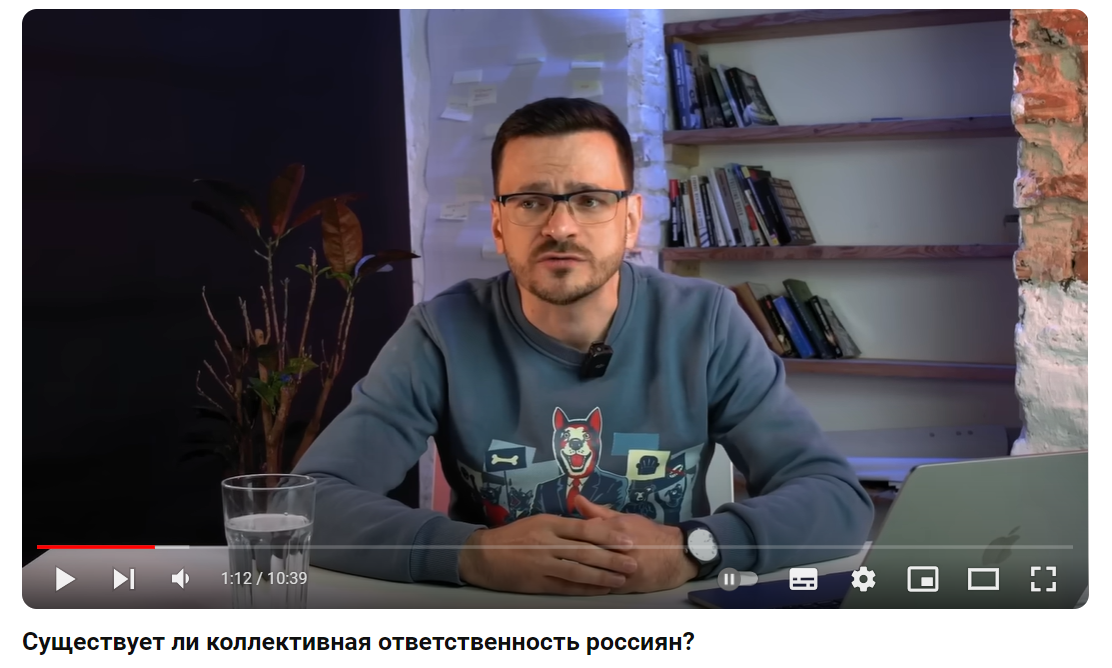
Ilya Yashin on X; screenshot by the IMI
“Is there any collective responsibility of Russians? Dotting the i’s. Responding to the criticism directed at me after a meeting with our supporters in Warsaw. In the new viseo, I discuss why I am actually against the idea of collective guilt, but believe it is important to be responsible for my country,” writes Yashin.
Yashin consistently ignores the Russians’ collective responsibility for supporting and tacitly approving the regime’s policies. We would like to remind that despite the repression and control over the media, a large part of Russian society consciously supports the war or does not oppose it.
It follows that to Ilya Yashin, Russia’s attack on Ukraine is an opportunity to focus the West’s attention on the fate of Russian citizens, to improve their life abroad, gain a foothold there and wait in case the situation “ripens” and the status of the Russians’ main political representative can be used in Moscow.
Yashin’s rhetoric appears to be an attempt by the Russian opposition to justify their own inaction and maintain support among Russian society. After all, refusing to admit collective guilt allows you to win the favor of the Russians who are not ready to be accountable for the war. This way, the opposition is seen in a favorable light by the international community as well, presenting itself as a victim of repression and not as part of a systemic problem.
The Navalny cult
Yulia Navalnaya is another contender for the status of the Russian opposition leader. Yet, her way of going about it is somewhat different from Yashin’s: more PR-oriented and glamorous. Her spokeswoman Kira Yarmysh regularly reports on Navalnaya’s participation in social events and the awards she is being showered with in Europe. “Today Yulia received the Woman of the Year award in the Woman of Courage nomination. The award was presented by former British Prime Minister Theresa May,” Yarmysh writes on X.
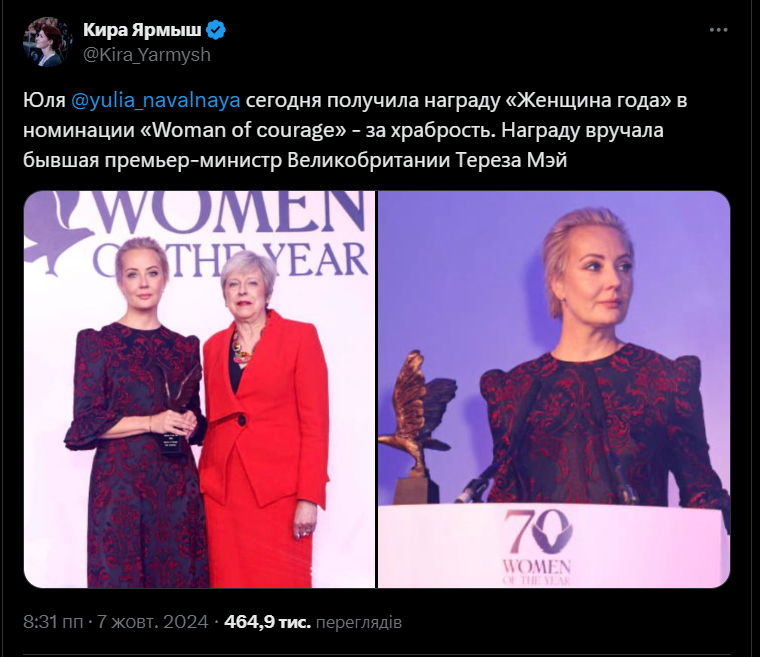
Kira Yarmysh on X; screenshot by the IMI
“The Spanish newspaper La Vanguardia awarded Yulia an international prize. The prize was presented to her by the Prime Minister of Spain, Pedro Sanchez,” said Navalnaya’s spokeswoman.
It seems that the collective West has chosen the strategy of legitimizing Navalnaya through symbolic awards. After all, so far the point or tangible impact of her work in terms of fighting the regime remain doubtful.
Yulia Navalna promotes herself as the number one representative of the “good Russia” in North America. “The trip to Canada was excellent. I am very grateful for such a warm welcome. For the conversation, for the interest in Russia. For supporting not just me, but also all Russians who are against Putin and against the war,” Navalnaya reports on X about her meeting with Prime Minister Justin Trudeau.
In the meantime, Yulia Navalnaya and her team are carrying out a rather original media campaign, which seems to be to create a cult around Alexei Navalny. This campaign shows the hallmarks of political mythmaking, which resembles the finest traditions of Russia’s authoritarian regime while relying on modern PR tools. Team Navalny’s social media accounts are full of quotes by Navalny, in particular from the recently published book “Patriot”, an autobiography of the politician who died in a Russian prison:
- “‘I am a citizen of Russia, I have rights in my country and I nave no intention to live in fear. If I have to fight, I will fight because I know I am right and they are wrong. Because in this situation I am on the side of good and they are on the side of evil. Because many people support me.’ – Alexei Navalny, from the book ‘Patriot’,” reads one of Yulia Navalnaya’s posts on X.
- “‘They are going to poison me’: what Navalny was contemplating in prison. The US magazine The New Yorker published excerpts from Alexei Navalny’s personal diaries written after he was imprisoned following his return to Russia,” reports the “Team Navalny” account.
Such messages alone could be seen as merely promoting a new book. But they acquire a deeper meaning when viewed in the context of Team Navalny’s other activities. Among other things, they promote the idea of renaming streets in the United States.
“After the post about the petition to rename a street in New York after Alexei Navalny, it was signed by over 1,000 people! And activists from various countries asked us to remind you about other initiatives to keep Alexei’s memory alive,” Team Navalny writes on Telegram.
Furthermore, Team Navalny actively shares videos of graffitis with the image of Alexei Navalny in various cities around the world.
Buenos Aires ❤️ pic.twitter.com/qH3siszWMA
— Team Navalny | FBK (@teamnavalny) October 14, 2024
Submitted from New York pic.twitter.com/G7KobgMsYD
— Team Navalny | FBK (@teamnavalny) October 15, 2024
Makes one wonder if such graffitis appear organically or if they are created by the same people who share these videos online. Either way, it is evident that Alexei Navalny’s followers are working to make him a democracy icon, and not just for Russia. Initiatives to rename New York streets hardly serve the interests of the people living in Russia. That is, the brand is being promoted to a Western audience.
Quotes from “Patriot” and excerpts from Alexei Navalny’s diaries, graffitis, and other PR activities shape the image of a fearless hero fighting evil, who believe that his plight is righteous and that the people stand by him. This narrative creates a myth of Navalny as the “leader of the nation” and Russia’s moral compass. This PR campaign is entirely centered around one person and actively promotes the black and white thinking characteristic of authoritarian cultures.
Once again, the focus on Navalny the person distracts from Russia’s systemic issues and creates the impression that changing the leader will automatically change the entire political situation in Russia.
Team Navalny’s agenda for Russians largely remains the same. They are exposing Putin’s corruption, as they have been doing for years.
“Where is he hiding? The houses and apartments owned by Putin and Kabayeva. Giant palaces, ski resorts, vineyards, swimming pools, hockey rinks, and chalets. All this is just a small part of the real estate that Vladimir Putin has acquired throughout the quarter of a century of staying in power,” Team Navalny says on X, announcing another “investigation”. It is easy to see how Yulia Navalnaya’s team pretends that curbing Russian corruption is more important than curbing Russian aggression.
Yulia Navalnaya’s and her team’s strategy actively uses elements of political mythology and a personality cult, which can be effective in mobilizing followers among Russians and attracting support from the West. However, this approach has its risks: it undermines the idea of collective accountability for Russia’s future, reducing it to one person.
The Russian opposition’s internal conflicts and escape from reality
The trust in the anti-corruption work of Alexei Navalny’s followers has been torpedoed by another “good Russian” – Maxim Katz, a definitely-not-pro-Putin activist. He accused Navalny’s anti-corruption foundation (FBK) of corruption.
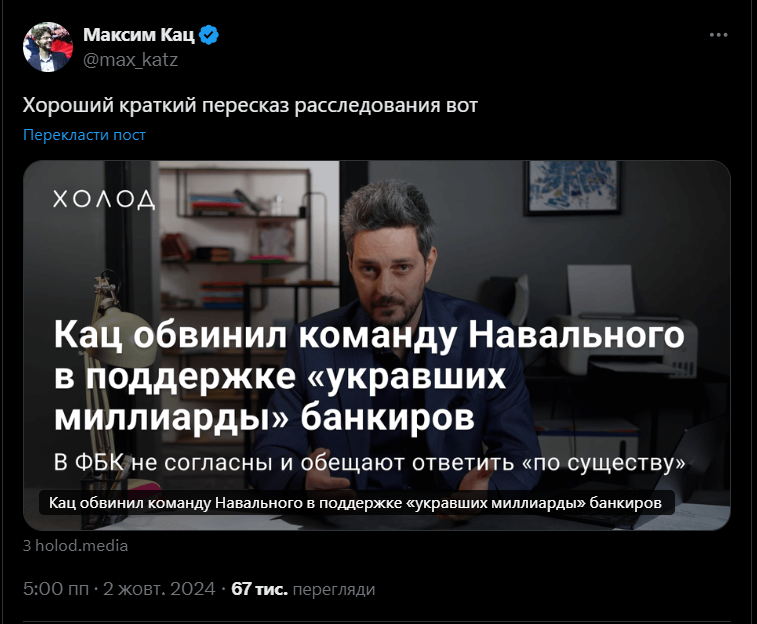
Maxim Katz on X; screenshot by the IMI
Nearly the majority of Katz’s posts on X are about his fight against the FBK. Namely, he complains that Navalny’s followers have not given a substantial answer to the allegations.
“They are intensifying the attempts to blur the main issue in my investigation. Both the FBK itself and their supporters discuss various peripheral topics, starting from Khodorkovsky and Gusinsky’s interests in this story and ending with my Israeli citizenship, all while carefully avoiding the main point: whether the FBK treasurer stole money from Probiznesbank clients,” writes Katz.
Maxim Katz’s corruption allegations against the Anti-Corruption Foundation point to deeper transparency and governance issues within the Russian opposition structures. This undermines the FBK’s moral credibility, which was built around their fight against corruption. If Navalny’s followers do not provide a clear response to the allegations, it creates the impression that they are dodging responsibility, which will further undermine their credibility as the opposition.
The conflict between Maxim Katz and Navalny’s followers highlights the lack of cohesion among the Russian opposition, which is more preoccupied with infighting than with uniting against a common enemy.
So far, it seems that Navalny’s – or Navalnaya’s – team is going lose to Katz in the duel for the domestic audience’s affection. Although, perhaps, this does not bother them all that much, since all of them – Yulia Navalnaya, Vladimir Kara-Murza, Andrei Pivovarov, Ilya Yashin, and the rest of Russia’s political emigrants – are actively looking for attention and recognition in the West specifically: both from the political leaders and from the Russians who left their country.
Ksenia Fadeeva, the former head of Navalny’s Tomsk HQ, was another one of the prisoners released in the August swap. She is currently not active in Europe and only gave one interview since being freed, which has been uploaded to YouTube by the channel Govorit NeMoskva. However, it is Fadeeva who articulates the answer with maximum clarity when asked whether effective and deliberate action by the Russian opposition is possible.
“Everything is very difficult, very sad. But I have no doubt that all this will be overcome, because the demand from society has not gone anywhere. I believe there are tens of millions of people in Russia who do not support the war, do not support Putin. In any case, they want to have their own representatives who express their views. So I think that the situation will somehow improve over time,” says Ksenia Fadeeva in the interview.
Hoping that the situation will somehow improve by itself seems to be the Russian opposition’s primary strategy. But the oppositionists become much more energetic when it comes to playing political activism in Europe and North America. So far, the “good Russians'” political activism rather resembles imitating hard work to acquire political capital, status and awards in Europe and America.
As a result, the Russian opposition faces deep crises such as internal conflicts, lack of strategy, and excessive focus on external legitimization. Instead of consolidating and developing a real action plan for making a difference in Russia, the opposition is focused on gathering support and recognition in the West. In view of the war and the horrors that Ukraine is experiencing, this approach seems especially cynical and problematic, as it reduces the chances of real change in Russia.
Dmytro Barkar, Oksana Romaniuk


